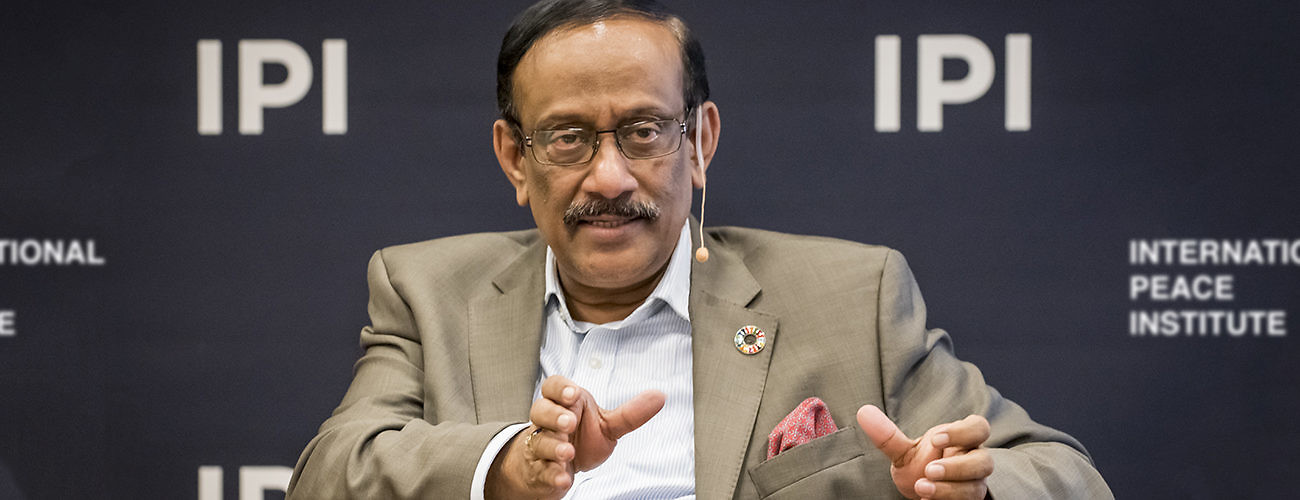Some 18 months after 700,000 people fled Myanmar’s Rakhine state, camps in neighboring Bangladesh are now hosting more than one million refugees. Though Myanmar and Bangladesh agreed in November 2017 to a procedural framework for repatriation of these refugees—most of them Rohingyas from Rakhine state—the increased instability there has not allowed for safe, dignified, and voluntary returns.
The resulting humanitarian crisis and what to do about it was the subject of an IPI Speaker Series talk on March 1st by Bangladeshi Foreign Secretary Md. Shahidul Haque. He opened his remarks by saying that the matter had been badly distorted.
“There has been an attempt to make the whole issue from a humanitarian crisis to a military conflict between Myanmar and Bangladesh,” Mr. Haque said. In fact, he said, “this is between Myanmar and its own nationals, the Rohingyas… it is not an interstate fight, it is an ethnic issue.”
In a briefing to the United Nations Security Council the day before, UN Special Envoy for Myanmar Christine Schraner Burgener had reported that the refugees in the Cox’s Bazar area of Bangladesh find themselves in “extremely challenging temporary conditions.” And she said they would continue in danger indefinitely in the absence of moves to end violence, improve humanitarian access, probe the causes of the crisis, and promote equitable development.
Mr. Haque said that the displaced people were in deeply deforested areas, with no infrastructure and no market system even to buy necessities. “But one of the most challenging situations that we are confronted with was not with shelter, not with food, but health,” he said. “Health is an area which often creates a crisis within a crisis.”
The World Health Organization aided in getting necessary vaccines after an outbreak of diphtheria, and individual governments and local NGOs were providing health services, he said. His own government tried to help by sending in troops with health supplies, but women ran away, thinking they were Myanmar soldiers, he said. “It took two or three days to make them understand this is not the Myanmar military, they are not going to kill you, but they are going to help you.” Bangladesh subsequently tried to make sure that those providing aid were women, he said.
Mr. Haque listed three necessary steps for improvement – addressing the “root causes” of the conflict, holding perpetrators of atrocity crimes accountable, and ensuring the safety and security of minority communities, especially the Rohingyas. He added that “international pressure on Myanmar is critical.”
He said that all civilians “irrespective of religion and ethnicity must be protected in Myanmar,” and he proposed accordingly that civilian zones with no military presence be established within the country under UN supervision. He also encouraged international organizations and the UN to collect the evidence that would be needed to investigate and prosecute atrocities. “Unless you bring in the whole issue of accountability and justice,” he said, “you cannot permanently resolve this problem, you cannot ensure that next time there won’t be another exodus.”
IPI Vice President Adam Lupel, the moderator of the discussion, concluded the session, saying, “My takeaway is this really is a multi-dimensional, multi-layered, multigenerational crisis… This really is a long-term problem with very urgent short term demands, but a need for a long-term perspective on both the history and the resolution. In some ways, it’s a real good case for what we’re calling in this neighborhood the ‘triple nexus’, a crisis that is both the peace and security, development, and human rights all in one which makes it very complicated but also in some sense maps out what kind of process needs to be engaged for a resolution.”








